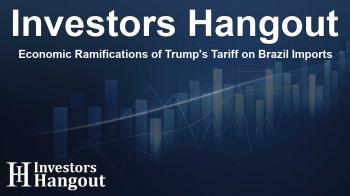Economic Ramifications of Trump's Tariff on Brazil Imports

Understanding the Recent Tariff Imposed on Brazil
Recently, President Donald Trump's administration has decided to implement a significant 50% tariff on all imports from Brazil. This move has sparked concern among economists, suggesting that it sets a worrying precedent for international trade policy.
The Economic Concerns Raised by Economists
Economists have expressed their fears that this drastic tariff may disrupt existing trade relations, particularly since the U.S. has maintained a trade surplus with Brazil for several years. Trump, however, cited 'unsustainable trade deficits' as a rationale for this substantial import tax, which many find contradictory.
Reasons Behind the Tariff
While the specific reasons for implementing this tariff have sparked debates, the recent political climate in Brazil has played a crucial role. Trump has linked the tariff to the ongoing political situation involving Jair Bolsonaro, a former president and ally of Trump, who is currently facing legal challenges. Such a move, highlighted by economists, could set a dangerous example where trade policies are used to influence a country's internal matters.
The Precedent for Future Tariffs
Experts are concerned that this tariff marks a troubling trend. Thierry Wizman, a strategist and economist, noted this could lead to scenarios where tariffs are utilized as tools to affect a nation’s judicial and political environment, rather than merely economic disputes. This trend could significantly alter international trade dynamics.
Possible Retaliatory Actions
In response to Trump's tariff, Brazil's current leadership has hinted at possible retaliatory tariffs, emphasizing that they will respond in kind if the U.S. maintains its aggressive trade stance. This could escalate tensions further between the two nations, impacting various sectors and industries.
The Broader Impacts on Businesses
Trump's decision has immediate repercussions for American companies engaged in business with Brazil, particularly companies like Trump Media & Technology Group's DJT, Rumble Inc.'s RUM, and the Brazilian aviation giant Embraer S.A. (ERJ). Following the announcement of the tariffs, shares of Embraer dropped significantly, demonstrating how quickly tariffs can influence market confidence and stock values.
Market Reactions to Tariffs
The imposition of tariffs often leads to unpredictable market behavior. For example, Embraer witnessed a 4.65% decline in its stock prices soon after the announcement, underscoring the sensitivity of market players to potential trade regulations. The connections between policymaking and the financial market's response are evident and critical for stakeholders.
Conclusion: Navigating the New Trade Landscape
As we observe the potential implications of Trump's tariff on Brazil, the focus remains on how this could reshape trade policy going forward. Companies need to navigate an increasingly volatile environment where political decisions can ripple through markets unexpectedly. The interconnectedness of global trade means that the ramifications of such tariffs can extend far beyond the immediate betroffen, causing waves across different sectors and international relations.
Frequently Asked Questions
What are the main reasons for Trump's 50% tariff on Brazil?
The tariff was primarily implemented due to claims of unsustainable trade deficits and as a response to political tensions involving Brazil's former president.
How has the stock market reacted to the announcement?
Shares of major companies like Embraer have already seen significant declines immediately following the tariff announcement, indicating market volatility.
What are the potential consequences of retaliatory tariffs from Brazil?
Retaliatory tariffs could escalate trade tensions between the U.S. and Brazil, potentially leading to a broader trade war that affects numerous industries.
Why are economists worried about this tariff?
Economists fear this sets a precedent where tariffs might not just serve economic purposes but are also employed to influence domestic political affairs in other countries.
How can businesses prepare for these trade changes?
Businesses need to adapt their strategies to handle potential fluctuations in trade policies and market reactions to maintain stability in operations.
About The Author
Contact Hannah Lewis privately here. Or send an email with ATTN: Hannah Lewis as the subject to contact@investorshangout.com.
About Investors Hangout
Investors Hangout is a leading online stock forum for financial discussion and learning, offering a wide range of free tools and resources. It draws in traders of all levels, who exchange market knowledge, investigate trading tactics, and keep an eye on industry developments in real time. Featuring financial articles, stock message boards, quotes, charts, company profiles, and live news updates. Through cooperative learning and a wealth of informational resources, it helps users from novices creating their first portfolios to experts honing their techniques. Join Investors Hangout today: https://investorshangout.com/
The content of this article is based on factual, publicly available information and does not represent legal, financial, or investment advice. Investors Hangout does not offer financial advice, and the author is not a licensed financial advisor. Consult a qualified advisor before making any financial or investment decisions based on this article. This article should not be considered advice to purchase, sell, or hold any securities or other investments. If any of the material provided here is inaccurate, please contact us for corrections.

